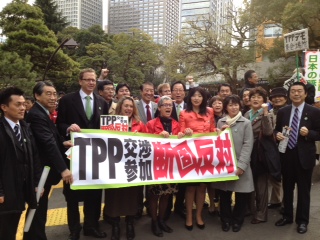U.S. to negotiate ‘new, better’ trade deals with key economies: report
Japan Times | 2 March 2017
U.S. to negotiate ‘new, better’ trade deals with key economies: report
The administration of U.S. President Donald Trump will negotiate “new and better trade deals” with “countries in key markets” to provide a freer and fairer deal for American workers and businesses, the Office of the U.S. Trade Representative (USTR) said in an annual report released on Wednesday.

The report submitted to Congress stopped short of naming the key economies the United States will bilaterally negotiate with on increased market access, but Japan is almost certainly among them.
Referring to the U.S. withdrawal in late January from the 12-nation Trans-Pacific Partnership free trade agreement, the report said it “paved the way for potential bilateral talks with the remaining TPP countries,” including Japan.
The report is likely to fuel speculation that the United States may propose negotiations with Japan for a bilateral FTA in a high-level economic dialogue the two governments are planning to start in April.
The USTR said the Trump administration is focusing on “bilateral negotiations rather than multilateral negotiations,” in stark contrast to the previous administration of President Barack Obama, who championed the TPP, a trade deal that does not involve China.
In line with Trump’s “America First” mantra, the new administration’s trade policy is aimed at boosting U.S. economic growth and job creation, strengthening the U.S. manufacturing base and expanding U.S. farm and service industry exports, as well as promoting reciprocity with trading partners, according to the report.
The TPP, which was part of the U.S.-led response to the rise of China, “failed to provide adequate market access of American-made goods and agricultural products,” it said.
However, the report said, “USTR intends to continue strong bilateral engagement with our Asia-Pacific partners to maintain American influence in the region,” brushing aside concern that the U.S. withdrawal from the TPP would increase China’s clout in the region.
Citing an over 300 percent jump in the U.S. trade deficit in goods and services with China from 2000 to 2015, the USTR said, “While the current global trading system has been great for China, since the turn of the century it has not generated the same results for the United States.”
The USTR also questioned the U.S.-South Korea FTA, saying that while U.S. imports of goods from South Korea grew more than $13 billion from 2011 to 2016, Washington’s exports of goods to Seoul shrank $1.2 billion in the same period.
“The time has come for a major review of how we approach trade agreements,” it said.
“We will hold our trading partners to higher standards of fairness, and we will not hesitate to use all possible legal measures in response to trading partners that continue to engage in unfair activities.”
Meanwhile, the report said the Trump administration will take aggressive action to counter other countries’ unfair trade practices and may not be bound by World Trade Organization rulings it regards as interfering with U.S. sovereignty.
Vowing to defend national sovereignty over trade policy, it said, “Even if a WTO dispute settlement panel — or the WTO Appellate Body — rules against the United States, such a ruling does not automatically lead to a change in U.S. law or practice.”
If the Trump administration refused to comply with WTO rules and decisions, it would represent a shift from the Obama administration’s adherence to the world trade watchdog in its challenge to unfair trade practices by countries such as China.





